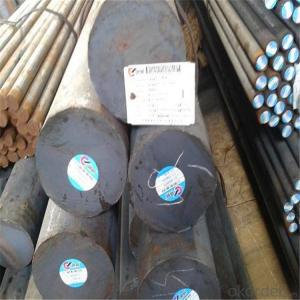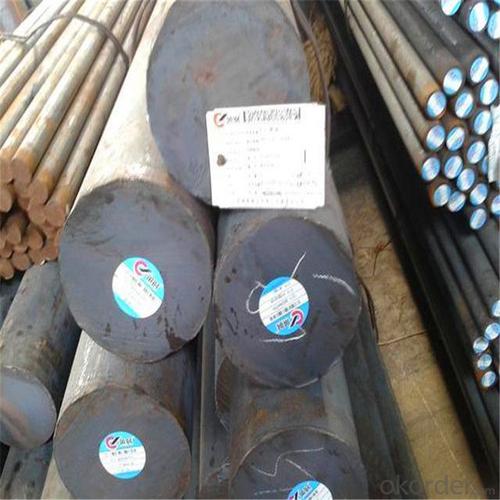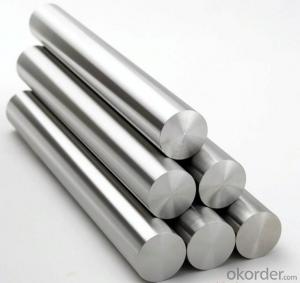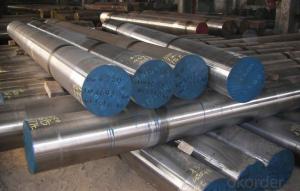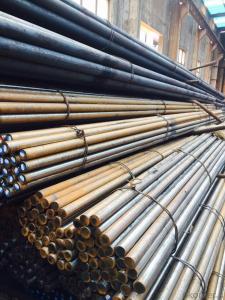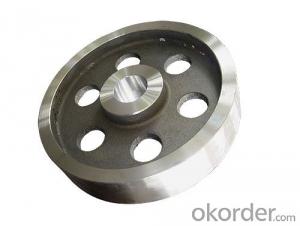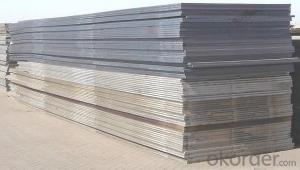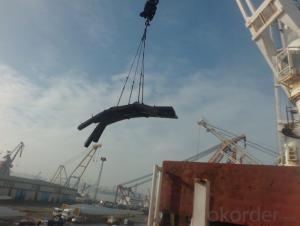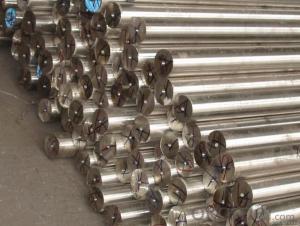Hot Rolled Carbon C22 Steel for Construction
- Loading Port:
- Tianjin
- Payment Terms:
- TT OR LC
- Min Order Qty:
- 25 m.t.
- Supply Capability:
- 500000 m.t./month
OKorder Service Pledge
OKorder Financial Service
You Might Also Like
Specification
Hot Rolled Carbon C22 Steel for Construction
Product Description of Hot Rolled Carbon C22 Steel for Construction
1. Steel grade: SAE1020, 20#, C22, S20C
2. Length: 6M-12M
3. Diameter: 16mm-300mm
4. Product range: round bar, flat bar, square bar
5. Technique: Hot rolled, forged, cold drawn
Specification of Hot Rolled Carbon C22 Steel for Construction
Material | C22 | Round bar | Dia(mm) | 16-300mm |
Process | EAF + LF + VD + Forged + Heat Treatment (optional) | Length (mm) | Max 12m | |
Heat treatment | Normalized / Annealed / Quenched / tempered | Flat bar | Thickness(mm) | 8-500mm |
Delivery condition | Hot forged +Rough machined (black surface after Q/T)+ Turned (optional) | Width(mm) | 70-200mm | |
Test | Ultrasonic test according to SEP 1921-84 D/d | Length (mm) | Max 12m |
Chemical Composition of Hot Rolled Carbon C22 Steel for Construction
C | Si | Mn | Cr | Ni | Cu |
0.17~0.23 | 0.17~0.37 | 0.35~0.65 | ≤0.25 | ≤0.30 | ≤0.25 |
Photo Show of Hot Rolled Carbon C22 Steel for Construction
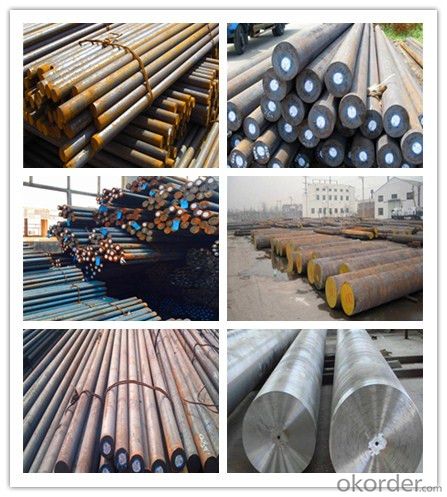
Packing and Delivery:
Packing in bundle package, or as customer's requirements.
Delivery Detail: 45 days after receiving the deposit.
Usage and Applications of Hot Rolled Carbon C22 Steel for Construction
1. Steel round bar is used in a large number of architectural and engineering structures. Or it can be used in construction of plants for the production of steel house frames, high-voltage transmission towers, bridges, vehicles, boilers, containers, ships, etc.
2. And we can use this kind of product on the performance of the mechanical parts if the demand is not very high.
3. Some special material steel round bar can be used for main shaft of steamer, hummer shank, with big section and supper force.
Company Information
CNBM International Corporation is the most important trading platform of CNBM group.
Whith its advantages, CNBM International are mainly concentrate on Cement, Glass, Iron and Steel, Ceramics industries and devotes herself for supplying high qulity series of refractories as well as technical consultancies and logistics solutions.


F A Q
1, Your advantages?
professional products inquiry, products knowledge train (for agents), smooth goods delivery, excellent customer solution proposale
2, Test & Certificate?
SGS test is available, customer inspection before shipping is welcome, third party inspection is no problem
3, Factory or Trading Company?
CNBM is a trading company but we have so many protocol factories and CNBM works as a trading department of these factories. Also CNBM is the holding company of many factories.
4, Payment Terms?
30% TT as deposit and 70% before delivery.
Irrevocable L/C at sight.
5, Trading Terms?
EXW, FOB, CIF, FFR, CNF
6, After-sale Service?
CNBM provides the services and support you need for every step of our cooperation. We're the business partner you can trust.
For any problem, please kindly contact us at any your convenient time.
We'll reply you in our first priority within 24 hours.
- Q: What are the quality control measures for steel round bars?
- Quality control measures for steel round bars typically involve a series of inspections and tests to ensure that the bars meet the required specifications and standards. These measures are crucial to ensure the structural integrity and reliability of the steel bars. Some common quality control measures for steel round bars include: 1. Visual Inspection: This involves a visual examination of the bars to detect any surface defects such as cracks, pits, or rust. It ensures that the bars have a smooth surface finish and are free from any visible imperfections. 2. Dimensional Inspection: This involves measuring the diameter, length, and straightness of the steel bars to ensure they meet the required tolerances. Any deviations from the specified dimensions can affect the performance and fit of the bars in various applications. 3. Chemical Composition Analysis: Steel round bars undergo chemical composition analysis to verify the percentage of various elements present in the steel. This analysis helps ensure that the bars have the correct alloying elements in the right proportions, which directly impacts their mechanical properties and performance. 4. Mechanical Testing: Various mechanical tests are performed on steel round bars to assess their strength, hardness, and other mechanical properties. These tests can include tensile testing, impact testing, and hardness testing. These tests help determine if the bars meet the required strength and durability standards. 5. Ultrasonic Testing: Ultrasonic testing is often used to detect internal defects such as voids, inclusions, or cracks in steel round bars. This non-destructive testing technique uses high-frequency sound waves to identify any flaws that may compromise the structural integrity of the bars. 6. Surface Treatment Inspection: If the steel round bars undergo any surface treatments such as heat treatment or coating, an inspection is conducted to ensure that the treatments are properly applied and meet the required specifications. 7. Certification and Documentation: Quality control measures also include proper documentation and certification of the steel round bars. This ensures traceability and provides evidence that the bars have undergone the required inspections and tests, giving customers confidence in the product's quality. Overall, these quality control measures for steel round bars help ensure that the bars are of high quality, meet the required specifications, and are suitable for their intended applications.
- Q: Is round steel bar round steel?
- NoRound steel bars refer to hot rolled round steel bars for reinforced concrete. Round bars include high-quality carbon structural steel, round steel, ordinary carbon structural steel round bars, steel bars for prestressed concrete, etc.. Although the shape is round, but the material is different, so steel and round bar is two yards.
- Q: What are the advantages of using sulfur-alloy steel round bars?
- Sulfur-alloy steel round bars offer several benefits. Firstly, they have superior machinability compared to other steel types. Adding sulfur to the alloy reduces friction between the tool and workpiece, resulting in smoother cutting and lower cutting forces. This simplifies and improves the efficiency of machining, saving time and reducing costs. Secondly, sulfur-alloy steel round bars possess excellent chip-breaking properties. The sulfur content encourages the formation of small, brittle sulfide inclusions within the steel, which act as effective chip breakers during machining. These inclusions break the chips into smaller pieces, preventing tangling and issues like built-up edges or poor surface finish. Another advantage is the improved surface finish of sulfur-alloy steel round bars. The sulfur content in the alloy minimizes the occurrence of built-up edges or burrs during machining. As a result, a smoother and more precise surface finish is achieved, which is particularly crucial for applications that require aesthetics or tight tolerances. Moreover, sulfur-alloy steel round bars exhibit good wear resistance. The sulfur content forms hard sulfide inclusions that enhance the hardness and wear resistance of the steel. This makes it suitable for applications subjected to abrasive wear, such as gear or bearing manufacturing. Lastly, sulfur-alloy steel round bars are frequently more cost-effective compared to other high-performance alloys. Adding sulfur is a relatively inexpensive process, making sulfur-alloy steel a more affordable option for many applications. This makes it an appealing choice for industries that require high-quality steel while considering costs. In conclusion, the benefits of using sulfur-alloy steel round bars include improved machinability, enhanced chip-breaking properties, better surface finish, good wear resistance, and cost-effectiveness. These advantages make sulfur-alloy steel round bars a popular choice in various industries, including automotive, aerospace, and manufacturing.
- Q: Can steel round bars be heat treated to enhance their properties?
- Yes, steel round bars can be heat treated to enhance their properties. Heat treatment is a process of heating and cooling the steel in a controlled manner to alter its microstructure, which in turn improves its mechanical properties such as strength, hardness, toughness, and ductility. There are several heat treatment methods that can be applied to steel round bars, depending on the desired outcome. One common method is quenching and tempering. In this process, the steel is heated to a high temperature to form a uniform austenitic structure, and then rapidly cooled by quenching it in a medium such as oil or water. This rapid cooling transforms the austenite into a harder and stronger structure called martensite. However, martensite can be brittle, so the steel is then tempered by reheating it to a lower temperature, which reduces the brittleness and increases toughness while maintaining the desired hardness. Another heat treatment method is annealing, where the steel is heated to a specific temperature and then slowly cooled to relieve internal stresses and improve ductility. This process can also refine the grain structure of the steel, resulting in improved machinability and formability. In addition, there are other heat treatment methods such as normalizing, stress relieving, and case hardening, each designed to enhance specific properties of the steel round bars. Overall, heat treatment is a versatile and effective technique to enhance the properties of steel round bars, allowing them to meet specific requirements for various applications in industries such as manufacturing, construction, automotive, and aerospace.
- Q: What are the common alloying elements used in steel round bars?
- The common alloying elements used in steel round bars are carbon, manganese, silicon, and sometimes chromium, nickel, and molybdenum.
- Q: Can steel round bars be used in the production of construction materials?
- Indeed, the utilization of steel round bars is feasible in the manufacturing of construction materials. Owing to their remarkable robustness and endurance, steel round bars find frequent application within the construction sector. These bars are instrumental in fortifying concrete structures, exemplified by the reinforcement of beams, columns, and slabs, thereby enhancing their resilience and steadfastness. Furthermore, in the construction of buildings and bridges, steel round bars can be employed in the creation of steel frames, trusses, and various structural constituents. The widespread popularity of these bars stems from their adaptability and capacity to endure substantial burdens in the construction industry.
- Q: How do you measure the diameter of a steel round bar?
- To measure the diameter of a steel round bar, you can use a caliper or a micrometer. First, ensure that the round bar is clean and free from any debris or rough edges. Place the round bar on a flat surface. If you have a caliper, open it and position one jaw on one side of the round bar and the other jaw on the opposite side. Make sure that the jaws are aligned perpendicular to the bar and are in contact with the outer surface. Gently close the caliper until both jaws are firmly against the bar. Read the measurement on the caliper's scale or digital display. This will give you the diameter of the round bar. Alternatively, if you have a micrometer, open it and set the thimble to zero. Position the anvil (stationary part) against one side of the round bar and the spindle (moving part) against the opposite side. Rotate the thimble until the spindle firmly contacts the bar. Read the measurement on the thimble's scale or digital display along with the corresponding number on the barrel. This will give you the diameter of the round bar. Remember to take multiple measurements at various points along the bar to ensure accuracy, as the round bar might not have a perfectly uniform diameter throughout its length.
- Q: What are the different shapes available for steel round bars?
- Steel round bars are available in various shapes to suit different applications. The most common shapes include: 1. Round: This is the most basic and widely used shape for steel round bars. It is cylindrical in shape and has a circular cross-section. Round bars are used in a wide range of industries such as construction, automotive, and manufacturing. 2. Square: Square steel round bars have a square cross-section. They are often used in applications that require added strength and stability, such as structural support columns, fences, and ornamental ironwork. 3. Hexagonal: Hexagonal steel round bars have six sides and a hexagonal cross-section. They offer a good balance of strength and versatility and are commonly used in applications such as machine parts, fasteners, and tooling. 4. Flat: Flat steel round bars have a rectangular cross-section with a narrow width and thick height. They are commonly used in construction and manufacturing for applications such as braces, brackets, and supports. 5. Half-round: Half-round steel round bars have a semi-circular cross-section. They are often used in architectural and decorative applications such as handrails, edging, and trim work. These are some of the most common shapes available for steel round bars. The choice of shape depends on the specific requirements of the application, including strength, stability, and aesthetics.
- Q: Can steel round bars be used for making security grilles?
- Yes, steel round bars can be used for making security grilles. Steel is a durable and strong material that provides excellent security for windows and doors. Round bars can be welded together to create a sturdy framework for the security grilles. Additionally, steel round bars can be easily customized and shaped to fit any size or design requirement, making them suitable for various types of security grilles. The hardness and toughness of steel also make it resistant to cutting or tampering, further enhancing the security features of the grilles. Overall, steel round bars are a reliable choice for making security grilles due to their strength, durability, and customization capabilities.
- Q: Can steel round bars be used in high-pressure applications?
- Yes, steel round bars can be used in high-pressure applications. Steel round bars are known for their strength and durability, making them suitable for various industrial and mechanical applications. They have the ability to withstand high pressure and provide structural stability, making them a popular choice in industries such as oil and gas, construction, and manufacturing. However, it is important to choose the right grade and quality of steel round bars to ensure they can withstand the specific pressure requirements of the application.
Send your message to us
Hot Rolled Carbon C22 Steel for Construction
- Loading Port:
- Tianjin
- Payment Terms:
- TT OR LC
- Min Order Qty:
- 25 m.t.
- Supply Capability:
- 500000 m.t./month
OKorder Service Pledge
OKorder Financial Service
Similar products
Hot products
Hot Searches
Related keywords
